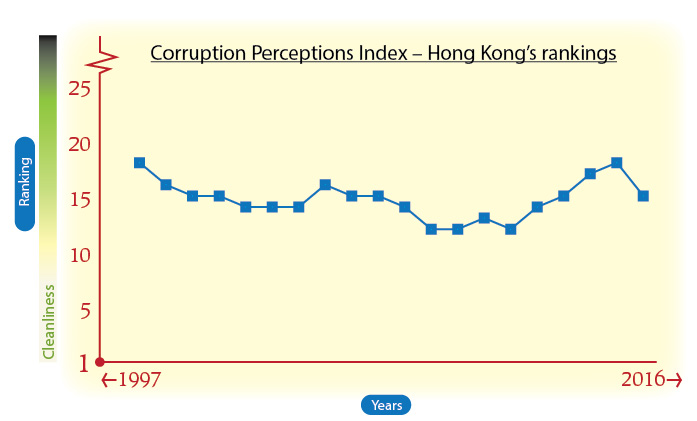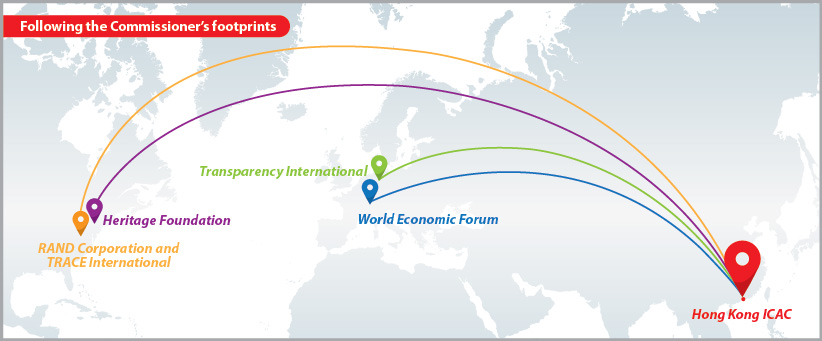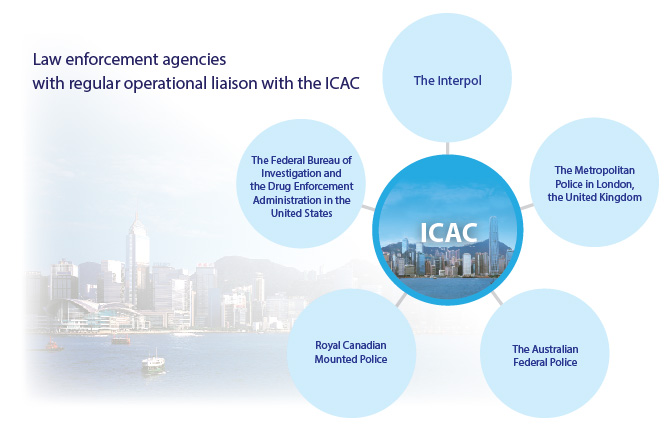20th Anniversary of HKSAR:
ICAC remains committed in next two decades and beyond
As Hong Kong is entering its 21st year as a Special Administrative Region (HKSAR), let us take a moment to reflect on how its anti-graft agency farers in keeping corruption at bay and helps putting the city on the map since the reunification.
International anti-graft surveys
In the past two decades since 1997, various international and local surveys have ranked Hong Kong one of the cleanest places in the world, and recognised its relentless efforts in the fight against corruption.
In the Corruption Perceptions Index (CPI) published annually by Transparency International, a Berlin-based international anti-graft watchdog, Hong Kong has stayed in the top 20 notches, despite a three-fold increase in the number of countries and territories surveyed.
The CPI is a poll of polls based on a number of international/regional opinion surveys, which reflects the perception of respondents in a particular country or territory.
In 1997, Hong Kong was ranked the 18th least corrupt place among 52 countries and territories in the CPI. After 20 years, the city climbed to the 15th least corrupt place among 176 countries and territories in 2016, three places up from the previous year's ranking. The survey results affirmed that the culture of probity was deeply rooted in Hong Kong.

The Geneva-based World Economic Forum compiles its annual Global Competitiveness Report (GCR), which assesses the competitiveness landscape of over 140 economies to provide insight into the drivers of their productivity and prosperity.
Over the years, the GCRs had identified 16 most problematic factors for doing business, including corruption. In Hong Kong, a very small percentage of respondents, ranging from 0.2 per cent to four per cent, found corruption a problematic factor for doing business in the city.
Ever since the Index of Economic Freedom (IEF) was published by the US-based public policy research institute Heritage Foundation in 1995, Hong Kong has been ranked the world's freest economy.
In ranking Hong Kong as the world's freest economy among 180 countries and territories for the 23rd consecutive year in its IEF released in February 2017, the Heritage Foundation praised Hong Kong for its excellent track record in combating corruption. "There is little tolerance for corruption, and government integrity is buttressed by a high degree of transparency," it said.
Hong Kong's probity was further affirmed by the US-based TRACE International, a renowned international anti-corruption consultancy firm.
In 2014, TRACE International, in collaboration with research institute RAND Corporation, launched the TRACE Matrix (TM), which assesses the corruption risk of a country/territory through four domains: business interaction with government, anti-bribery law and enforcement, government and civil service transparency, and capacity of civil society oversight. Each territory is accorded a score from 0 to 100. The lower the score, the lower risk of bribery.
The 2014 TM ranked Hong Kong the 4th economy with the lowest business corruption risk among 197 economies, with a score of 23. According to the survey report, there was "a very low expectation of bribes" in business transactions with the government in Hong Kong.
In the second matrix issued in 2016, Hong Kong was ranked the 4th among 199 countries and territories with the least corruption risk and an improved score of 17. Once again the report noted there was a "very low expectation of bribes" in Hong Kong when doing business with the government, while the city's anti-bribery laws and enforcement were both considered of "high quality".
Local anti-graft survey
Locally, the Political and Economic Risk Consultancy, Ltd. (PERC) has also ranked Hong Kong one of the cleanest places in Asia since 1997, on a scale of 0 to 10 with zero being the best grade possible and 10 the worst.
In 1997, Hong Kong was ranked the second cleanest place among 12 Asian countries/places with a score of 3.03, just behind Singapore. Twenty years on, the city was rated the third cleanest place among 14 Asian countries/places in 2017 with a score of 3.67. Singapore remained on top scoring 1.60, while Japan was the second with a score of 2.92.
The 2017 report noted that the majority of respondents considered corruption levels remained steady over the past 12 months in Hong Kong.
PERC surveys – Hong Kong's rankings and scores (1997 - 2017)
Year |
Asian countries/places involved * |
Ranking |
Score # |
|---|---|---|---|
2017 |
14 |
3 |
3.67 |
| . . . |
. . . |
. . . |
. . . |
2012 |
14 |
3 |
2.64 |
| . . . |
. . . |
. . . |
. . . |
2007 |
13 |
2 |
1.87 |
| . . . |
. . . |
. . . |
. . . |
2002 |
12 |
3 |
3.33 |
| . . . |
. . . |
. . . |
. . . |
1997 |
12 |
2 |
3.03 |
* excluding Australia and the United States
# with zero being the best grade possible and 10 the worst
Keeping the international arena up-to-date
Despite international and local recognitions of the probity level of Hong Kong and the clean business environment the city offers, there is no room for complacency. The ICAC has spared no effort in keeping both local and international ranking institutions abreast of our latest initiatives. Mr José Carlos Ugaz, who became the new Chair of Transparency International in 2014, paid his first visit to Hong Kong in October 2016. While asserting that the ICAC was one of the strong allies in the fight against corruption, he was particularly impressed with its holistic three-pronged strategy in fighting corruption through investigation, prevention and education.
Mr José Carlos Ugaz, who became the new Chair of Transparency International in 2014, paid his first visit to Hong Kong in October 2016. While asserting that the ICAC was one of the strong allies in the fight against corruption, he was particularly impressed with its holistic three-pronged strategy in fighting corruption through investigation, prevention and education.
"The ICAC has been a key player in substantially reducing corruption in Hong Kong… It sets an example for the world on how to deal with such a problem," Mr Ugaz stressed.
Mr Ugaz's predecessor Dr Huguette Labelle made a debut visit to Hong Kong in 2009 to learn first-hand the city's anti-corruption work. She said Hong Kong's anti-corruption model had been often cited as an example of success in promoting global anti-corruption awareness.
To reciprocate, the ICAC Commissioner paid Dr Labelle a visit in Berlin, Germany in April 2014 and briefed her on Hong Kong's anti-corruption initiatives. At the meeting, Dr Labelle praised Hong Kong for enjoying a very high international rating as a clean city and remaining a forerunner in the fight against corruption.
The Commissioner also took the opportunity to fly to Geneva, Switzerland to meet with senior officials of the World Economic Forum, and brief them on the latest probity situation in Hong Kong.
In May 2015, the Commissioner paid another visit to Transparency International and met with its Deputy Managing Director Mr Miklos Marschall and Research Coordinator Mr Santhosh Srinivasan.
The Commissioner also took the opportunity to call on Heritage Foundation in Washington DC; RAND Corporation and TRACE International in Arlington County, the United States.

'The more we share, the more we have'
 Following the ratification by the Central People's Government (CPG), the United Nations Convention against Corruption (UNCAC) was extended to Hong Kong in February 2006. Since then, the CPG has designated the ICAC as the agency to assist other signatories in developing and implementing anti-corruption measures, an obligation the ICAC holds dearly. Having come a long way, the Commission recognises the importance of experience sharing and learning from each other in fighting the graft battle.
Following the ratification by the Central People's Government (CPG), the United Nations Convention against Corruption (UNCAC) was extended to Hong Kong in February 2006. Since then, the CPG has designated the ICAC as the agency to assist other signatories in developing and implementing anti-corruption measures, an obligation the ICAC holds dearly. Having come a long way, the Commission recognises the importance of experience sharing and learning from each other in fighting the graft battle.
To foster the implementation of the UNCAC and promote international cooperation in the fight against corruption, the International Association of Anti-Corruption Authorities (IAACA) was formed. The IAACA comprises over 300 members from anti-corruption agencies around the world, including the ICAC, and other related organisations.
As a member of the Executive Committee of the IAACA, the ICAC Commissioner took part in deliberations of its work plan, reviews of the implementation of the UNCAC, knowledge sharing as well as, among other items, cooperation among members.
Over the years, the Commissioner had attended meetings of the IAACA held in Mainland China, India, the Republic of Panama, Spain, Russia and Qatar to enhance global co-operation in graft fight.
In addition, the ICAC maintains close liaison with procuratorate authorities in Mainland China and law enforcement agencies around the world, fostering experience sharing in the international arena.

Putting our heads together
Over the years, the ICAC has recognised that international and regional symposia and seminars, where anti-graft experts gathered together, were effective platforms for stepping up liaison, fostering exchanges and widening our network.
Since 1997, the ICAC had organised six symposia on various anti-corruption themes, attended by over 2,700 delegates in total from over 60 jurisdictions. The 6th ICAC Symposium, entitled "A Future without Corruption - One Vision, Multiple Strategies", was held in May 2015.
This year, the sharing of experience focused on co-operation in financial investigation and asset recovery, which was part and partial to anti-corruption work. In the two-day ICAC International Seminar on Financial Investigation, themed "Cutting the Financial Vein of the Corrupt", held in May, over 250 participants from 41 jurisdictions shared respective strategies and tactics in detecting illicit financial fund flow and confiscating proceeds of crime.
